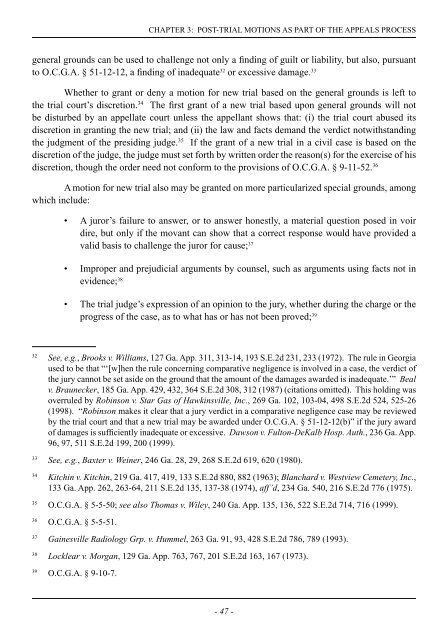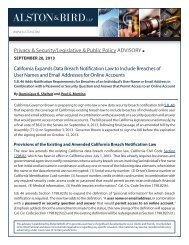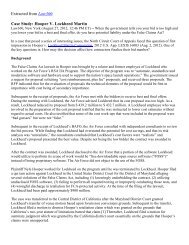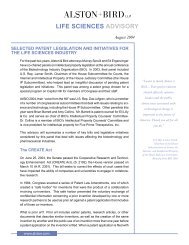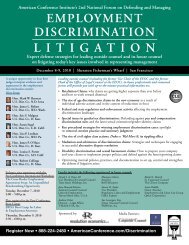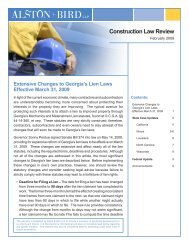Georgia Appellate Practice Handbook - Alston & Bird LLP
Georgia Appellate Practice Handbook - Alston & Bird LLP
Georgia Appellate Practice Handbook - Alston & Bird LLP
Create successful ePaper yourself
Turn your PDF publications into a flip-book with our unique Google optimized e-Paper software.
CHAPTER 3: POST-TRIAL MOTIONS AS PART OF THE APPEALS PROCESS<br />
general grounds can be used to challenge not only a fi nding of guilt or liability, but also, pursuant<br />
to O.C.G.A. § 51-12-12, a fi nding of inadequate 32 or excessive damage. 33<br />
Whether to grant or deny a motion for new trial based on the general grounds is left to<br />
the trial court’s discretion. 34 The fi rst grant of a new trial based upon general grounds will not<br />
be disturbed by an appellate court unless the appellant shows that: (i) the trial court abused its<br />
discretion in granting the new trial; and (ii) the law and facts demand the verdict notwithstanding<br />
the judgment of the presiding judge. 35 If the grant of a new trial in a civil case is based on the<br />
discretion of the judge, the judge must set forth by written order the reason(s) for the exercise of his<br />
discretion, though the order need not conform to the provisions of O.C.G.A. § 9-11-52. 36<br />
A motion for new trial also may be granted on more particularized special grounds, among<br />
which include:<br />
• A juror’s failure to answer, or to answer honestly, a material question posed in voir<br />
dire, but only if the movant can show that a correct response would have provided a<br />
valid basis to challenge the juror for cause; 37<br />
• Improper and prejudicial arguments by counsel, such as arguments using facts not in<br />
evidence; 38<br />
• The trial judge’s expression of an opinion to the jury, whether during the charge or the<br />
progress of the case, as to what has or has not been proved; 39<br />
32 See, e.g., Brooks v. Williams, 127 Ga. App. 311, 313-14, 193 S.E.2d 231, 233 (1972). The rule in <strong>Georgia</strong><br />
used to be that “‘[w]hen the rule concerning comparative negligence is involved in a case, the verdict of<br />
the jury cannot be set aside on the ground that the amount of the damages awarded is inadequate.’” Beal<br />
v. Braunecker, 185 Ga. App. 429, 432, 364 S.E.2d 308, 312 (1987) (citations omitted). This holding was<br />
overruled by Robinson v. Star Gas of Hawkinsville, Inc., 269 Ga. 102, 103-04, 498 S.E.2d 524, 525-26<br />
(1998). “Robinson makes it clear that a jury verdict in a comparative negligence case may be reviewed<br />
by the trial court and that a new trial may be awarded under O.C.G.A. § 51-12-12(b)” if the jury award<br />
of damages is suffi ciently inadequate or excessive. Dawson v. Fulton-DeKalb Hosp. Auth., 236 Ga. App.<br />
96, 97, 511 S.E.2d 199, 200 (1999).<br />
33 See, e.g., Baxter v. Weiner, 246 Ga. 28, 29, 268 S.E.2d 619, 620 (1980).<br />
34 Kitchin v. Kitchin, 219 Ga. 417, 419, 133 S.E.2d 880, 882 (1963); Blanchard v. Westview Cemetery, Inc.,<br />
133 Ga. App. 262, 263-64, 211 S.E.2d 135, 137-38 (1974), aff’d, 234 Ga. 540, 216 S.E.2d 776 (1975).<br />
35 O.C.G.A. § 5-5-50; see also Thomas v. Wiley, 240 Ga. App. 135, 136, 522 S.E.2d 714, 716 (1999).<br />
36 O.C.G.A. § 5-5-51.<br />
37 Gainesville Radiology Grp. v. Hummel, 263 Ga. 91, 93, 428 S.E.2d 786, 789 (1993).<br />
38 Locklear v. Morgan, 129 Ga. App. 763, 767, 201 S.E.2d 163, 167 (1973).<br />
39 O.C.G.A. § 9-10-7.<br />
- 47 -


